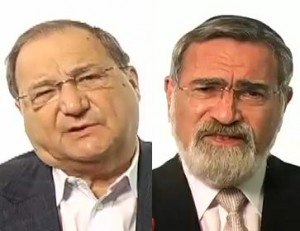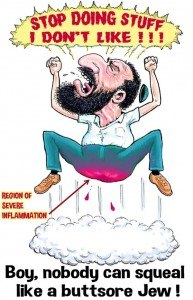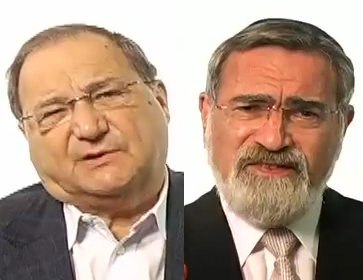 Abraham Foxman, National Director of the Anti-Defamation League, on Why Anti-Semitism Endures.
Abraham Foxman, National Director of the Anti-Defamation League, on Why Anti-Semitism Endures.
What is “anti-semitism”? Foxman says it’s jealousy, scapegoating, a “disease of the Christian world”. Take your pick. As a shyster performing the same schtick for decades, his explanation is remarkably incoherent. He doesn’t address why “anti-semitism” endures, nor why it follows the jews wherever they go.
Here’s Foxman again, on The Changing Face of Anti-Semitism.
Foxman estimates just how many Americans are “seriously infected with anti-semitism”; notes various aggressive measures jews use to promote their interests (litigatation, legislation, education); argues that “the greatest challenge is the internet”, “the dark underbelly”, “superhighway for bigotry”; claims the ADL “broke the back” of the KKK by promoting anti-mask laws in Georgia in the 1950s.
A transcript of the interview is at Big Think Interview With Abraham Foxman.
Though Foxman is the highest-profile spokesman for organized jewry in the US, and perhaps the world, he doesn’t come across as exceptionally intelligent or well-spoken. This is especially evident when he is contrasted with the highest-profile spokesman for organized jewry in Britain, Lord Rabbi Jonathan Sacks, Chief Rabbi of the United Hebrew Congregations of the Commonwealth.
In The “Fourth Mutation of Anti-Semitism” Sacks, like Foxman, paints “anti-semitism” in pathological/psychological/biological terms. Sacks provides a typical example of the jewish narrative – a one-sided version of European history, entirely sympathetic to jews and antipathetic to Europeans.
Sacks doesn’t just invert the jewish problem, he abridges it. He begins with the Greeks by excusing them, along with the Romans. He says “anti-semitism” stage one “got personal with the birth of Christianity” and characterizes it as “a hatred of jews, not of people in general”.
Stage two starts around 1096, having to do “with the massacre of jewish communities in Northern Europe during the First Crusade”. This is “when jews became a demonic force”, “the infidels, the anti-Christ”. He cites “the blood libel” as “demonic anti-judaism”.
As an aside, Sacks use of the term demonic is similar to Foxman’s use of the term bigot. In both cases it is blatantly hypocritical – professional bigot Foxman accusing jewry’s enemies of bigotry against jewry, and professional rabbi Sacks demonizing jewry’s enemies for supposedly demonizing jewry. “The blood libel”, to which both of these two professional jews refer, is in fact a defamation of Europeans.
Sacks dates “mutation three” to the coining of the term “anti-semitism” in 1879, which was “not religious hostility to judaism, but racial hostility to jews”. He claims with this understanding of jews, “all you could do was work for the extermination of the jews” and that “the holocaust was already implicit in that word itself”.
Jews regard anyone who recognizes jews as a potential threat, and ultimately as exterminationist. It is projection – a window into their own parasitic minds. Jews see themselves as separate even while they sniff out and pathologize any sign of awareness in their host. Such aggressive inversion confuses fair-minded people who, in the end, find it easier to swallow the mealy-mouthed platitudes jews offer than comprehend the relentlessly dishonest jew-centricity of jewish minds.
Sacks describes the “fourth mutation” as “demonic anti-zionism”, “focused not on jews as individuals but jews as a nation in their own sovereign state”, “poisoning the world peace”, “responsible for every kind of distress in the universe”.
A stereotypical jewish strawman argument. Jews are responsible for having their own sovereign state, of by and for themselves. They are also responsible for self-righteously organizing and lobbying to have every other sovereign state serve jewish interests as well. Jews, including Foxman and Sacks, do this and brag about it, as if it’s good and right. Objecting to it is what they characterize as “anti-semitism”.
Sacks asserts that “jews must never fight ‘anti-semitism’ alone”, that “the fight against ‘anti-semitism’ is led by non-jews” and is in fact “a government-led activity”. He cites “international conferences of parlimentarians” actively discussing ways to promote the best interests of jews.
The sad fact is that jews are effective in getting others to serve them, even to fight and die for them. The concern of jews like Sacks, however, is Why the Jewish Voice Isn’t More Self-Confident.
Sacks says it’s because jews are paranoid and define themselves as “the people who dwell alone”, “nature’s victims”, who everyone hates. Sacks says he disagrees with this self-image, though as mentioned above it is the same image reflected in the jewish narrative he recites.
“Why has being a jew become a burden?” Sacks explains, “that is the residue of “anti-semitism”. He defines judaism as “the voice of hope in the conversation of humankind”. His final assertion:
There’s nothing threatening about judaism because we don’t try to convert anyone. We say look, guys, this is how we see things. If it makes sense to you please have it, and if it doesn’t, that’s okay.
The reality is that jews argue and organize in order to tell others how to see things – what is right and wrong, what can or can’t be said or done. If this doesn’t make sense to you, and you argue or organize for your own benefit, then you will find that the jews have governments on their side.
Here is the Big Think page for the Sacks interview. The whole interview, including the two bits linked above, runs 14:35.
Some highlights: Sacks expresses his pride in building day schools for jews in Britain, says jews “have an influence out of all proportion to our numbers”, and sees “no model” for a Chief Rabbi in the US overlooking the pontiff-like, moralizing role played by Foxman.
 Lord Sacks renews attack on Jeremy Corbyn:
Lord Sacks renews attack on Jeremy Corbyn:

